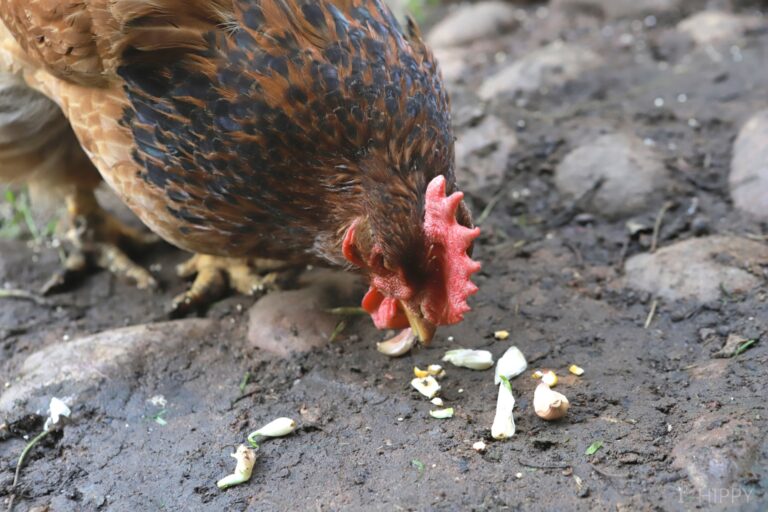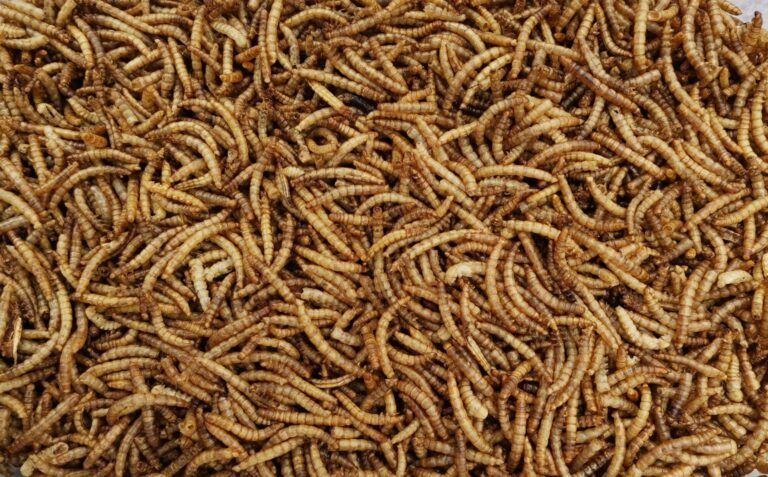If you want chickens, or you’ve been thinking about getting them, you likely already know that chickens are omnivores. This means that they eat both plant and animal matter. Naturally, chickens, like so many other birds, lovebugs and some of their very favorite bugs of all are mealworms.

Mealworms are actually insects, not true worms, but the name doesn’t matter much to chickens: They’re extremely nutritious and chickens will stop at nothing to get them. They’ll quickly become their favorite snack, and they can do a lot of good for your flock.
But mealworms do have some downsides, and depending on where you live, it might actually be illegal to feed them to chickens in the first place!
But don’t worry over that right now… Keep reading, and I’ll tell you everything you need to know about giving mealworms to your flock, the good and the bad!
What are Mealworms?
Mealworms, as mentioned, are not real worms. Instead, they are the larval phase of an insect, specifically the yellow mealworm beetle which is a type of darkling beetle.
That’s right; given enough time mealworms will metamorphose into big, black beetles to continue their lifecycle. But, while in this stage of life, they look like tan, segmented worms. Hence the name!
Are Mealworms Good for Chickens?
Yes, very. Mealworms are an excellent source of calories, protein, fat, vitamins, and minerals for chickens. No joke, they are a tremendously nutritious menu item for them!
Mealworms are roughly 50% protein and 25 to 30% fat, with the rest made up of fiber, water, and some other trace materials.
Concerning the mineral content, they are an excellent source of selenium, potassium, phosphorus, calcium, and more, and are very rich in vitamin C and vitamin E.
Together, these macro and micronutrients can significantly boost a chicken’s health, giving them plenty of energy of course but also helping them to deal with stress, illness, injury, molting, and more.
Mealworms have many benefits for chickens and you’d be wise to incorporate them into their diet as long as you do it smartly. We’ll get to that, and I’ll tell you all about them in the next section…
What are the Advantages of Feeding Mealworms to Chickens?
Mealworms have lots of benefits for your birds beyond just good nutrition, although that is reason enough to feed them!
Entertainment: chickens love eating mealworms, and they especially love live ones.
Scattering some mealworms in the run, your yard, or sometimes even in the coop and letting them scratch around and peck for them is a great way to get them more in touch with those ancient hunting instincts.
Even if you just give your birds a few, they’ll keep scratching and pecking, looking desperately to make sure there’s not just one or two more hiding. It’s a lot of fun for them, and something that you and your birds both can look forward to.
Molting Support: mealworms are one of the very best nutritional resources for chickens that are undergoing molting.
Molting is the process of a chicken replacing its feathers, and it always requires a ton of extra resources for them to complete while staying healthy. Mealworms are almost perfectly tailored, nutritionally speaking, to give them everything they need to complete the process in a timely fashion.
Better Eggs: mealworms are also remarkably good for helping out your laying hands. Chances are you probably already know that hens need lots of extra nutrients, especially calories, protein, and calcium, to properly form eggs and lay them at a high rate.
An undernourished hen will lay malformed eggs, stop laying completely, or even get sick herself. Mealworms are a good way to give her the extra food she needs in a convenient form.
Snack/Training Aid: did I mention already that chickens love mealworms? They really do! I know lots of owners that prefer to give their chickens mealworms as a special snack, usually in a special container that makes noise. Trust me, it won’t be long before your birds associate the jangling of the mealworm can or bag with good things, and they’ll come sprinting to you when you have it.
Aside from being a fun ritual, this is also a great way to train them to listen to you or follow you. A little bribe never hurt, right?
How About the Disadvantages?
As great as mealworms are, they aren’t something that you can feed to your chickens in unlimited numbers for a variety of reasons.
Weight Gain: mealworms are highly nutritious and a great source of energy, but they are simply two energy debts, and have too much fat, to be good for chickens and large quantities.
If you give your chickens too many or too often, weight gain is certain and it won’t take too long before they become obese. Mealworms are a snack or supplement, not a mainstay.
Ignoring Other Food: chickens love mealworms so much that they can actually start holding out for them in preference of other food. It’s true, especially if you tend to give them a few too many when feeding!
As good as mealworms are, they also are not nutritionally complete for chickens and they can’t survive on them alone. In time, nutritional imbalances will manifest with severe health consequences.
Diseases and Contaminants: mealworms, like all animal proteins and especially live animal proteins, can contain diseases.
Diseases run the usual gamut of bacteria, viruses, parasites, and the like, which can potentially infect your chickens and then even be passed on to people.
Other contaminants are things like chemicals and heavy metals, mostly occurring in mealworms out in the wild, but increasingly common in ones that are bought from unscrupulous sellers online or from brick-and-mortar businesses
Cost: mealworms are pricey as far as chicken treats and supplements go. They are excellent, and in my opinion well worth the cost, but you’re definitely going to spend more on them than you would other protein sources.

How Often Should You Give Mealworms to Your Flock?
As mentioned already, mealworms are best as a treat or supplement. You can give a small handful of mealworms to your flock once or maybe twice a week for larger breeds. A small handful, anywhere from ⅓ to ½ a cup, is sufficient for every 3 to 5 chickens you have.
Alternately, you can mix it into other foods to supplement it on the same schedule.
If you want to feed them as treats, you can hand them over individually more frequently to entice your chickens to follow you or obey.
Remember, moderation is key. Don’t give them large quantities, and don’t feed them mealworms every day.
At What Age Can Chickens Eat Mealworms?
Chickens will try to eat mealworms as soon as they can get at them, but you are wise to withhold them from young chicks. There are choking hazard, and can be difficult for them to digest. And as mentioned, they are not nutritionally complete.
I recommend you wait until your chicks are either 8 weeks old or fully feathered, whichever comes first, to let them try mealworms for the first time.
Are Live Mealworms Okay for Chickens?
Yes, they are. Live mealworms are just fine for chickens and in my opinion, this is the best and most entertaining way (for them).
They aren’t very fast, but they do wriggle and wiggle, something greatly enticing to chickens. They will love tracking them down in the dirt or leaf litter if you scatter them, too.
Are Dead Mealworms Safe?
Yes, they are. Mealworms that have either starved, gotten too cold or been gassed by CO2 and euthanized are also just fine for chickens as long as they are fresh. Don’t give your birds any dead mealworms that have started to decompose or are showing signs of mold or discoloration.
Can Chickens Eat Dried Mealworms?
Yes, they sure can. Dried mealworms are one of the most popular options for serving chickens and also highly convenient. Plus, for most of us, they are easier to handle and less creepy compared to live ones.
Is it Illegal to Feed Mealworms to Chickens?
No, not in the United States, although this is a rumor that persists for an understandable reason.
Notably, as of this article being published feeding dead, imported mealworms to chickens is still illegal in the UK and throughout the EU. Many other countries around the world also have bans on feeding mealworms to chickens.
But why is this? Simply, due to a few highly publicized outbreaks of bovine spongiform encephalopathy and cows back in the 1980s and then again in the 2000s, these nations implemented a blanket ban on feeding any animal-derived protein to livestock, period. That was the first step…
Then later on, in 2014, England announced a specific ban on feeding chickens any kind of animal protein at all, even insects that might have themselves fed on other animal protein.
With no way to verify that commercially sold mealworms, domestic or imported, were or were not fed on animal protein, they were banned. This was done in an effort to curb outbreaks of disease and transmission of harmful germs and other substances to consumers of said chickens.
This is considered a quirk in the UK nowadays and a petition had even been started to abolish it. So it’s not just a rumor, concerning the legality of mealworms for chickens, but it’s not a factor at all in the United States.
Tim is a farm boy with vast experience on homesteads, and with survival and prepping. He lives a self-reliant lifestyle along with his aging mother in a quiet and very conservative little town in Ohio. He teaches folks about security, prepping and self-sufficiency not just through his witty writing, but also in person.
Find out more about Tim and the rest of the crew here.
